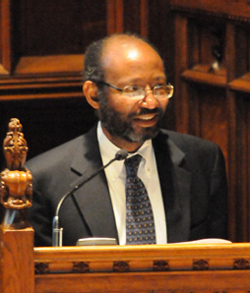Understanding inequality: Samuel Lucas
“Society by nature is resistant to change from the status quo,” Sachs said. “But structures produce that resistance.” He presented data that showed how, for instance, children of parents who did not complete high school are more likely to have inadequate reading skills and even worse mathematics skills. Children of less-educated parents were also more likely to drop out between 10th and 12th grades. The broader picture, Lucas argued, was of “profiles of educational inequality” that endure despite small improvements.
This, Lucas argued, should instill caution about reforms that simply aim to expand education resources: “If the inequality patterns are embedded, it won’t help.” He pointed to both quantitative and qualitative dimensions of inequality that entrench patterns of advantage. For instance, students need information to make choices, but access to good information varies widely. “Some face options with poor information or no information,” in part because parents may be less equipped to provide it.
Lucas said his research finds EMI present not just in the United States but in a set of 15 countries that he and colleagues are researching. He aims to present that research in a book, but for now he offered some advice for would-be reformers. He stressed anticipating and disarming resistance from those who are currently advantaged, contrasting “confrontation” versus “stealth” approaches to reform and emphasizing the importance of well-chosen reform language. Advantaged parents will more likely oppose “de-tracking,” for instance, than “individualized instruction.”
Lucas conceded his research did not make him optimistic about the possibilities of substantially reducing inequality anytime soon. But he argued that understanding how inequality reproduces, not just at the macro level but down to information and attitudes, is essential for any reform to succeed: “Behind the graphs are actions of individuals that sustain inequality,” he said. Otherwise many expensive and well-intended reforms will have little effect on inequality. “If you recognize that,” Lucas said, “you’re in a better position than if you just think you’ve done your job by expanding access.”
Published Tuesday, Mar. 29, 2011
